#I have no muse for anything
Explore tagged Tumblr posts
Text

恵 ; "blessing"
12/22: consider this piece my love letter to a character who has become so near and dear to me and who has inspired so much of my artistic growth this past year <3 happy birthday megumi, your name becomes you ⊹ ࣪ ˖
#my art#jujutsu kaisen#jjk#jjk fanart#jjk spoilers#jjk manga spoilers#fushiguro megumi#megumi fushiguro#jjk megumi#jujutsu kaisen fanart#when i tell u i worked on this piece for 7 days for 12hrs/day i am not exaggerating#i wanted to pull out all the stops i wanted this to be a full showcase of my skills#i was worried abt the angle bc birdseye/lookdown angles r always tricky and looking at it a month later i think i wld change some stuff but#overall i'm just so satisfied the background the flowers the colours#which btw the flowers KILLED me the rosary KILLED me his entire hand and sleeve area had me like why did i do this#but it was worth it it's all for him everything is for him id do ANYTHINg fr him do u understand me do. do you. do u understaND#if all i can offer him in tribute is art then u best bet i'm not gna cut corners#if that means hand rendering each individual turquoise vein and jade bead and paper fold then that's what i'll do#hbd again megumi u truly have become my muse <3
2K notes
·
View notes
Text
Guys. I've done it.
The animatic is finally here!!!! YAhooo!!
I really hope you like it. Took me something like two/three weeks on top of an insane amount of work, I don't know how I managed both-
If you want you can (re)watch it on Youtube! https://www.youtube.com/watch?v=mki1Vl3ylMM (yes this is self promotion)
#all for the game#aftg#the foxhole court#the raven king#the kings men#neil josten#palmetto state foxes#andreil#aftg animatic#i usually say (debatably) funny things in the caption but rn i can't think of anything i'm too excited of having finished this thing#noah's aftg series#MUSE PROPAGANDA (this is an art tag)
3K notes
·
View notes
Text






LONELY IS THE MUSE
Vevo Official Live Performance
#halsey#the great impersonator#lonely is the muse#halseyedit#halseydaily#folklouireedits#dailymusicqueens#dailymusicians#alternativequeens#popularcultures#second time i'm giffing anything after months and i kinda went off?????? just like halsey did with this song#top 10 of their discography hands down i will never get over it actually i don't have words#so here's this gifset#tw flashing#flashing gifs
296 notes
·
View notes
Text
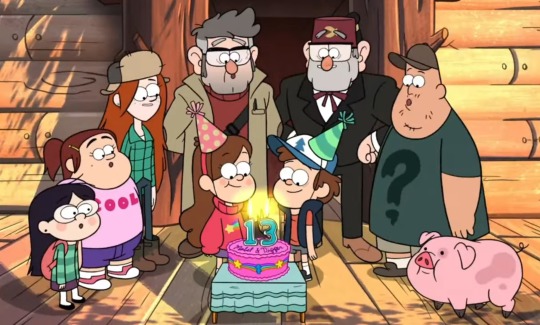
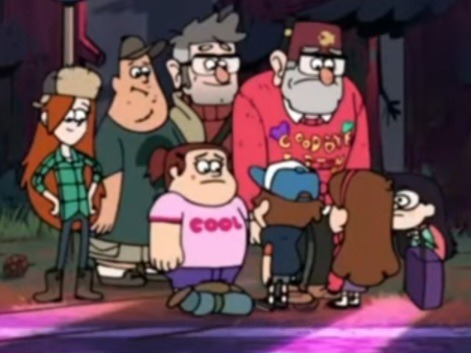

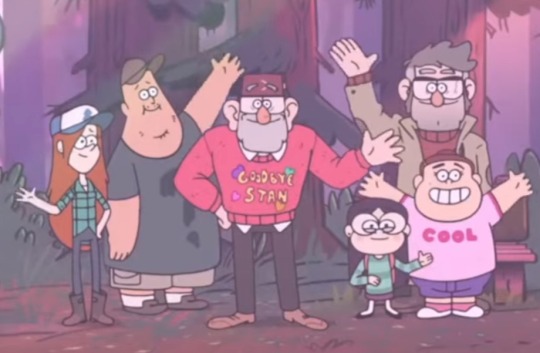
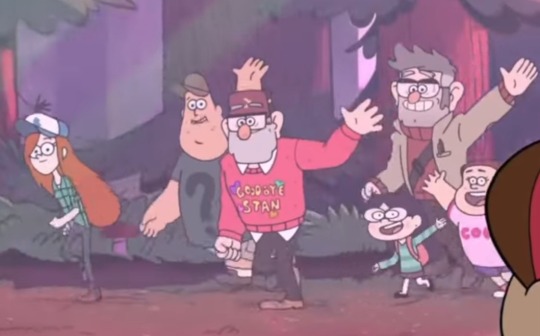
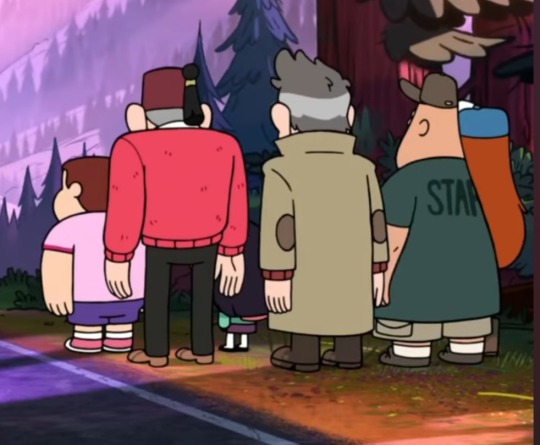
mystery shack family my beloved
#gravity falls#dipper pines#mabel pines#stan pines#ford pines#soos ramirez#wendy corduroy#candy chiu#grenda grendinator#meanwhile artists and alex be like *slaps paz's face over everyone but the twins*-- wHOA WHO SAID THAT HAHA#i have been musing about the two girls she hangs out with#the fact they show up quite a bit.... i wonder if she'll take the steps to actually being friends with them#(did she ever feel any solidarity with candy and grenda when they were the potato sack squad?#those two actually trying to be fashionable with it tho)#candy and grenda being mabel's best friends and wendy becoming dipper's best friend is so important to me#it is a shame that soos and ford didn't get their own goodbyes but also#the girls deserve this!!!!#they didn't get anything for the other books!!!!
181 notes
·
View notes
Text
"A dark shadow on an otherwise beautiful record": PR, McCartney and The Beatles' Split.
“No, I wasn’t angry – shit, he’s a good P.R. man, that’s all. He’s about the best in the world, probably. He really does a job. I wasn’t angry. We were all hurt that he didn’t tell us that was what he was going to do.”
(John Lennon in Rolling Stone, 21 Jan 1971)
To cut to the chase, I want to explain why this statement from John, claiming Paul is a good PR man is wrong. Largely thanks to quotes like this from John, Paul gets painted as the Beatle with a good media strategy, the insinuation being of course, that he is disingenuous and inauthentic. I don’t believe this is true in general, but what I really want to focus on, and what John is referencing in that quote, is the publicity around Paul’s 1970 album McCartney, which got all tied up with the news of The Beatles split, and how actually, mistake after mistake was made, rather than it being what John claims - a purposeful move to get more publicity for his album.
This isn’t a moral judgment on either John or Paul, or me saying Paul is stupid for not doing more. In fact, I think it playing out this way is far more interesting and we can gain a lot of insight about his mindset and relationships from his press activities around this time.
I’m going to do this chronologically as much as possible, but before we dive in it will be helpful for us to keep a few basic PR strategies and tools in mind to help us understand what’s (or perhaps more importantly, what’s not) happening. So what are some things that make for good public relations?
A clear, cohesive message. What's the story of the album? There should be key phrases that are repeated throughout press activities, and also allow an easy fall back when faced with questions that haven’t been prepared for. Broadly speaking, you want to highlight the good and ignore the bad, without lying or appearing to hide anything.
A good relationship with the press. Having even a couple of journalists on side can be a huge benefit, it makes for friendlier interviews and more forgiving assessments (which isn’t to say journalists are being fake or can be incentivised, but it’s just human nature that if you make friends, you’re going to have an easier time.) Furthermore, you want a reputation in the industry as someone that’s nice to interview, because journalists can and will talk, and if they’re going to come in with a preconception about you, you want it to be positive.
Reactive messaging. If something comes out that you don’t want to be out, be prepared. Ideally potential problems have already been planned for. Know which journalists to reach out to, know what the story is, then be prepared to go quiet and leave things alone.
Pre-prepared Q&As or FAQs should answer more questions than they generate. They also shouldn’t require in depth answers - save that for conversations where there’s time for explanations.
So, let’s start back in 1969. The Paul is dead rumours are in full force and Paul, Linda, Heather and Mary are living up in Scotland, trying to escape the goings-on back in London.
On 24 October, Paul gives an interview to the BBC dispelling the rumours about his death, which goes out on 26-27 October in two parts. A few days later, Dorothy Bacon and Terrence Spencer from Life Magazine make the trip up to his farm to try and get another interview with him, for a piece they’re also doing about the rumours.
Paul throws a bucket of dirty water at them, they get pictures, and then realising how this will look if published, Paul gives them an interview and promises to have Linda send them some family shots for the articles. In exchange they get rid of the photos they took earlier in the day.
So the first point here, that hopefully I don't need to spell out, is that you don’t wanna go throwing buckets of water at journalists. Thankfully, Paul did realise this and course corrected, but I can only imagine what the fall out would have been had he hadn’t gone after them. But what’s important for this story is that Paul is fed up with journalists and having to share his private life, he's emotional, and his instinct is to lash out.
The other thing that’s interesting here is a line that goes completely unnoticed. At this point, The Beatles split is not public knowledge.
The Beatle thing is over. It has been exploded, partly by what we have done, and partly by other people. We are individuals, all different. John married Yoko, I married Linda. We didn’t marry the same girl.
(Paul McCartney in Life Magazine, November, 1969)
This is huge, and it doesn’t get picked up by anyone else. It’s not made a big deal of in the Life article, it’s perhaps the clearest statement we get about the state of The Beatles, and yet it flies under the radar. I’d love to know exactly what the deal is here, but there’s not much we can do about that, but what we should start keeping in mind in this: there is no plan in place around The Beatles split. There is just an agreement to not make it public yet.
The McCartneys go back to London and Paul starts recording music with his new equipment at home. Later he books studio time when he decides he can make an album out of the songs he’s been working on.
Some key dates:
Paul finishes the album on 25 February.
The album is set to release on 17 April.
Ringo’s album get rushed to release two weeks early on 27 March and Let It Be is also supposed to be released in April.
On 31 March John and George send a letter, delivered by Ringo, asking Paul to delay the release of McCartney. Paul refuses and Let It Be gets moved instead.
Which brings us to April. Prior this, Paul realised that if he’s going to be putting an album out he’s going to have to do some publicity, but the problem is… well, there’s a few; he’s never had to do publicity for a solo album and simply doesn’t have the knowledge, his relationship with Apple has completely deteriorated which includes the people who have been handling this stuff for him in the past, and lastly, he doesn’t want to be dealing with press. Refer back to him and the bucket.
Thankfully, Peter Brown and Derek Taylor from Apple’s press office, tell him he does need to do something and to an extent, he listens. They select a handful of papers he’ll do interviews with, and Peter Brown puts together a Q&A for Paul to answer, which will go out to journalists in the press kit with their early copy of the album (x).
What I would love to do here is a question by question breakdown of that press kit Q&A but I’m conscious of how long this is already so I won’t… but before we get into that, here are a few more key events:
7 April: The Eastmans issue a press release with news about Paul’s solo album and his acquisition of the film rights for Rupert The Bear. This is covered mostly by American press on 8 April who speculate that this could mean the end of The Beatles. (An important note here is the lack of communication between the Eastmans and Apple, not knowing what materials each other are providing is not helpful).
9 April: McCartney press kits are sent to journalists.
9 April: Before Don Short at the Daily Mirror clocks off for the night, he is called by an Apple employee who tells him Paul has definitely quit.
10 April: The Daily Mirror breaks the news with the headline ‘Paul Is Quitting The Beatles’.
10 April: After doing interviews all day, Derek Taylor issues a statement regarding The Beatles. It doesn’t say much, which he acknowledges, because there’s not much he can say at this point. Another important note here, is that not even the head of publicity of Apple knew what was going on with The Beatles. There is no communication, and with no communication there can be no plan.
(Paul McCartney Project page that covers all this)
So what happened that made The Beatles split go from speculation to a certainty? It’s all to do with that Q&A. Of course, with the Eastman’s press release people were going to start connecting the dots, but that call Short got from his source isn’t presented as a rumour.
Now, there’s a lot to say about this Q&A because Paul's answer are so unhelpful and you can feel his attitude. I think the fact this was allowed to go out is a fundamental piece of evidence of Paul’s relationship with Apple at the time. No one wanted to tell him no, and he certainly wasn’t going to give them more than the bare minimum.
And lets be really clear here. This is a Q&A for his new album. Obviously the state of the Beatles was going to be brought up which is why Peter Brown included the questions, but the number of the questions on that topic and then Paul’s answers, make it really confusing and it’s no wonder this is what press picked up on, rather than just talking about Paul’s album. There are 41 questions in total, and 13 of them are asking him about his relationship to the other Beatles, Apple and Klein. That’s just over a third of the Q&A talking about things that he doesn’t want to be talking about. The fact he didn’t just tell Apple that he wasn’t going to answer some of the questions shows how little forethought went into this on his part. There was a much more concise way to do this, and I do not believe for a second Paul wanted further questions about the state of the Beatles when he’s trying to promote his first solo album.
And remember what I said at the top, about how if you’re gonna be promoting something in the press you want clear messaging around it? That’s already going be difficult now this Q&A has tied so much of the Beatles split into their messaging, despite Paul actually having a pretty clear idea of what the album’s story is aside from that, but the answers Paul gives to those questions just add further confusion.
Link to full Q&A.
Q: Were you influenced by John’s adventures with the Plastic Ono Band, and Ringo’s solo LP? A: Sort of, but not really. Q: Will they be so credited: McCartney? A: It’s a bit daft for them to be Lennon-McCartney-credited, so ‘McCartney’ it is. Q: Will the other Beatles receive the first copies? A: Wait and see. Q: Is it true that neither Allen Klein nor ABKCO have been nor will be in any way involved with the production, manufacturing, distribution or promotion of this new album? A: Not if I can help it. Q: Did you miss the other Beatles and George Martin? Was there a moment eg, when you thought ‘wish Ringo was here for this break?” A: No. Q: Are you planning a new album or single with the Beatles? A: No. Q: Is this album a rest away from the Beatles or the start of a solo career? A: Time will tell. Being a solo album means it’s the start of a solo career… and not being done with the Beatles means it’s a rest. So it’s both. Q: Is your break from the Beatles temporary or permanent, due to personal difference or musical ones? A: Personal differences, business differences, musical differences, but most of all because I have a better time with my family. Temporary or permanent? I don’t know. Q: Do you see a time when Lennon-McCartney becomes an active songwriting partnership again? A: No. Q: What is your relationship with Klein: A: It isn’t – I am not in contact with him, and he does not represent me in any way. Q: What is your relationship with apple? A: It is the office of a company which I part-own with the other three Beatles. I don’t go there because I don’t like the offices or business, especially when I’m on holiday.
So what can we get from this? It’s the start of a solo career for Paul, he doesn’t know if The Beatles break is permanent or temporary, he’s not in contact with Klein and Klein doesn’t represent him, he owns part of Apple but he doesn’t like going there, and he seems very certain that the Lennon-McCartney partnership is over, despite not being sure if The Beatles will play together again or not.
It’s a mess. It raises further questions. The only reason I can think of for it being so long is Peter Brown trying to cover absolutely everything he could think a journalist would ask, but it’s given Paul far too much scope for muddled answers, and in some cases, factually incorrect ones. He is tied up with Klein whether he likes it or not, because Klein’s tied up with Apple and Paul still has a contract with them.
It’s no wonder that this becomes the focus of the media narrative, and it makes Paul panic.
So on 16 April, the day before McCartney was released, Paul sits down with journalist Ray Connolly. And we move from story making, into reactive messaging. There is some thought behind this - Connolly is friendly with The Beatles and had actually already been aware of the split thanks to an off the record chat with John, so he was a good choice. The interview was published in the Evening Standard, a few days after the album had come out.
And here’s why you want a friendly journalist to talk to, because as the world rushed to say that Paul had broken up the band, Connolly led his article with this:
Paul McCartney didn’t kill the Beatles. If the group is dead, McCartney might be seen as the last survivor. If he has quit, and he still hasn’t confirmed it, he was the last to go.
(Paul McCartney in the Evening Standard, 21-22 April 1970)
However, the interview is also extremely telling about where Paul’s at emotionally in this moment.
A few days ago Paul McCartney decided to break his year-long silence and be interviewed. He wanted to clear up the confusion about his relations with the other Beatles and Allen Klein, and to kill the rumours that he was now ‘a hermit living in a cave somewhere with a ten-foot beard’. He wanted to show that he really was a happily married man with ‘a nice family and a good life’. But most of all he wanted to talk, to work things out in conversation, as much, I suspect, for his own benefit as anything.
This is not what you want to be doing with a journalist, you want to have this worked out before the conversation.
We met for lunch in a Soho businessman’s restaurant. With hardly moments for the hellos, he’d launched into his theme, talking rapidly and intently, and only occasionally allowing Linda to come in as support and verification. He wanted to put it all straight, to show that no one was to blame for what had happened, and when after two and a half hours’ non-stop talking he had cleared up his mind and mine too, he laughed, said he felt better now, got into his car and went home.
This demonstrates the lack of media training he had. It’s a stark difference to the confidence he had doing press with the other Beatles, on his own and with a particular idea to get across he appears nervous and controlling. Long form interviews like this are a marathon, not a sprint, and had he had an advisor or representative that was willing to push back against him, he would have known how to handle this better.
Moreover, an interview of this sort should have been done and published prior to the album coming out, or at least on the day of. Yes, there were always going to be questions about The Beatles tied up with this release, but one long interview like this, that had been properly prepared for, could have gone a long way to keeping the story straight. He also, despite his steamroller-ing of the conversation to begin with, comes across much more balanced about the situation than he does in those Q&A answers, so leading with something like this would have put him on much better footing.
So let's just pause here. What have we got so far? We've got Paul wanting to do as little press as possible, and with a breakdown of communication with his press team resulting in minimal planning and advice. This goes completely against the picture John is trying to paint.
And I’m not done yet. Because now we need to talk about the response to the album which wasn’t what I imagine Paul had wanted. There are two reviews I’m going to focus on here, firstly from Disc & Music Echo, written by Penny Valentine.
I don’t know what he was thinking when he planned this album. Perhaps he is laughing at us all. That’s fine, but it’s a pretty cruel way of doing it… almost a betrayal of all the things we’ve come to expect.
(Disc & Music Echo review, 18 April 1970)
It’s really harsh, but also this is within her right as a journalist. And what should someone do if they’re getting bad reviews? Ignore them. Thank the fans. Thank the people who say nice things. Don’t highlight negative attention, and certainly don’t lash out.
And look, there’s a lot to be said about Paul, Linda, John and Yoko’s press communications over the 70s, the Melody Maker letters spring to mind, and I’m very aware that I’m looking at this from 2025 when PR is much bigger and better oiled machine, almost to the point of it being quite boring and predictable. I do, however, also think that ‘don’t lash out at journalists who don’t like your work’ is common sense.
So Paul and Linda writing to Disc & Music Echo is a bit much to my eyes:
Dear Penny hold your hand out you silly girl I am not being cruel or laughing at you. I am merely enjoying myself. You are wrong about the McCartney album. It is an attempt at something slightly different, it is simple, it is good and even at this moment it is growing on you, love. – Paul and Linda McCartney.
(Paul and Linda's telegram to Disc & Music Echo, 25 April 1970)
It’s condescending, and if you want to plant the seeds of what your album is meant to be, there are much better places and ways to do it. Again this is reactive, showing little to no planning earlier in the year.
But here’s the thing that actually, completely baffles me. On the same day, in the same paper, another article gets published, this time by Derek Taylor, with the by line reading ‘Derek Taylor, Beatles Press Officer’. This just shouldn't happen. I can’t think of another case where someone’s PR is coming to their rescue in print. That’s not their job, and yes, Taylor used to be a journalist but he’s not anymore. I think this is way more to do with the way the people that have been with the Beatles since the early days are so emotionally wrapped up in this, they weren’t the people that should have been handling this.
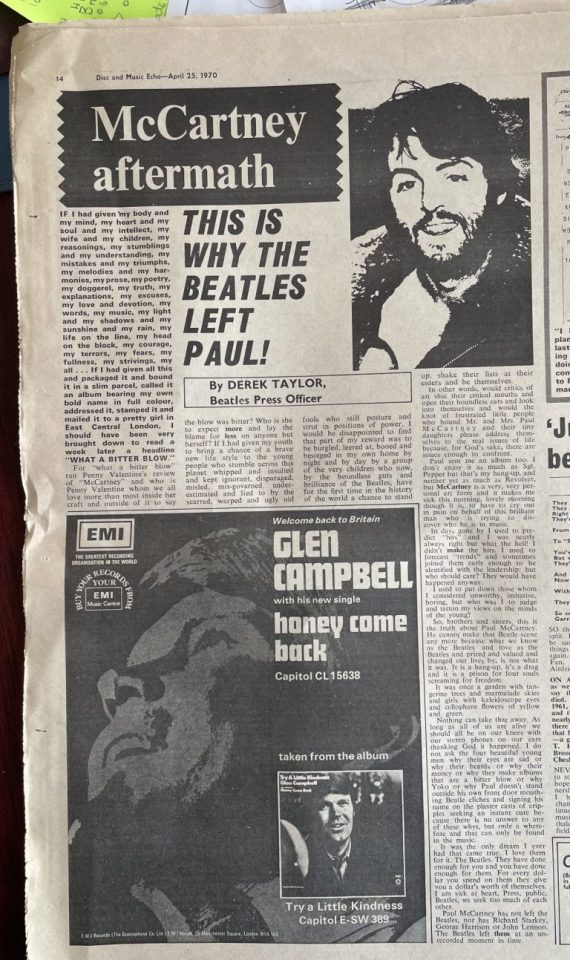
(x)
It also shows though, that however much Paul was distancing himself from Apple, there were people still there who loved him. It’s an emotional, beautifully written piece calling for people to leave Paul alone, but also not a good PR move, especially when he’s highlighting a specific journalist. Whether Paul asked Derek to do this, or Derek did it of his own accord, I don’t know, but it looks defensive and if I was a journalist, I’d be rolling my eyes.
Which brings us to the final part of this, the Rolling Stone review, published on 14 May 1970, nearly a month after the album came out, and largely not about the album at all, but a lot of focus on Paul’s handling of the situation.
The review of the actual songs is pretty complimentary, but this is also a personal attack on Paul.
(Full review)
Unfortunately, there is more to this album than just music. Accompanying the release of McCartney was a mass of external information — all of it coming directly from Paul himself — which casts real doubt on the beautiful picture which the songs create.
The sheets contain even more assertions about how happy and peaceful Paul and Linda are these days, and some interview statement from Paul concerning his relationship to the Beatles — statements which drip a kind of unsavory vindictiveness.
My problem is that all of the publicity surrounding the record makes it difficult for me to believe that McCartney is what it appears to be. In the special package of information which Paul wanted to include with the album we find startlingly harsh statements.
The lasting effect of this publicity campaign is to cast a dark shadow on an otherwise beautiful record. Listening to it now I cannot help but ask if Paul is really as together as the music indicates, how could he have sunk to such bizarre tactics?
I don't think this needs much commentary. You know something’s gone wrong with your PR when that becomes the focus, rather than the thing you’re actually trying to promote.
If we return to the four things I listed above, I think we can pretty resolutely lay out what I wanted to do.
Was there a clear, cohesive message? Around the album itself, sort of, Paul knew what it was. But it got tied up with the news of The Beatles split, the messaging around which was confusing with no one sticking to the same story. He also didn't do enough before the album came out, to get that messaging about his album stuck in people's heads. So overall, no.
Did he build good relationships with press? No. He threw a bucket at one. He provided confusing press kit material, even to journalists he was friendly with he came across in a manner that was worth noting in an article, he sent a bitchy telegram to a journalist who wrote a bad review, and this all culminated in Rolling Stone spending more time talking about his publicity than his album.
Did Paul have reactive messaging prepared? Evidently not, and then given the chance to provide some, he came across as panicked to the journalist he was speaking to.
Did his Q&A provide clear, simple answers to common questions he was likely to get asked? No, it was overly long, asking the same questions in multiple ways and no editing was done to his short, snappy, confusing, and incorrect answers.
I don’t want to give the idea that Paul, overall, is just shit at PR. (I mean, there's a difference between being a good spokesperson and good at PR but I won't get into that). He’s a highly successful musician who by all accounts, is now extremely good at interviews and making journalists feel at ease. He’s Paul fucking McCartney. But John saying this, in direct reference to this period of press activities is just not true. The album did well for Paul in the charts and sales, yes, but I’d argue that’s despite all this, rather than because of it.
And it’s also important to reiterate, that Paul simply wasn’t interested in doing a lot of publicity. He wasn’t even sure this was going to be an album when he started writing the songs. He didn’t want people coming to his farm, invading his new family life (and rightly so), he didn’t want to be on TV or the radio every day. That’s why his Q&A is so terse and why he hadn’t put any thought in how he was going to talk about The Beatles. And whilst how he felt is understandable, what he needed were a team around him willing to push back, steer him, and were separate from Apple. That’s the only way, I think, this could have gone differently.
Even then, he probably wouldn’t have listened to them anyway:
I don’t think I need a manager in the old sense that Brian Epstein was our manager. All I want are paid advisers, who will do what I want them to do. And that’s what I’ve got.
(Paul McCartney in the Evening Standard, 21-22 April 1970)
And that’s really the crux of it all, because you can’t do good with PR with someone who doesn’t want to take advice and thinks they know best. And I love him for it.
#paul mccartney#the beatles#john lennon#linda mccartney#ref:mccartney#ref:paul#ref:breakup#ref:press#please feel free to let me know if i've missed anything or made a mistake#this is really just my musing on a weird af pr campaign and so i've probably missed things#but hopefully it makes sense!#there's also A LOT i could have said about why i think john even says this#but that's gonna have to be another post for another day
90 notes
·
View notes
Text
I'm stealing this from my lit teacher but he posed that something certain characters in arcane s2 missed were 'Zuko Alone' moments. Moments where characters took an extended amount of time to introspect, face the consequences of their actions, and connect with the wider world. This, to me, is why Caitlyn's arc wasn't as effective as it could've been. After a switch-up, after a big 180 like hers, it is simply necessary to track the progression of her arc. It's easy to say "In hating you, I've hated myself" and "no amount of good deeds can undo our crimes" but when you don't see her face the Zaunites or acknowledge the class-privileges she exploited, it all rings a little hollow. Arcane usually does a good job of tying the personal with the political and I think that's hidden in Cait's arc. She works as a character when you're understanding her actions in relation to her love for Vi and forgiveness of Jinx. She doesn't if you think of it on a wider socio-political scale. It's just a little odd when the show is such an arbiter of 'show don't tell'. That line has to do alot of heavy lifting. Alas, what time restraints does to an arc.
#i say this with so much love btw cait is very precious to me#i think her arc still works to some degree but like i said - could've been a lot more effective esp in terms of political messaging#i also hate the tone of the discourse around her rn. where did all the nuance go. get behind me and also cait go stand in the corner.#also before anyone says anything i know that she gives up her council seat to sevika. we should've gotten a conversation.#i think we might've if they didn't have to cut the episode for time#it's not a matter of 'OMG ARCANE HAS TO SPELL EVERYTHING OUT FOR YOU'#you don't hinge a key character moment on an implication#it's the fact that it would fix the 'cait doesn't engage with the consequences of her actions' issue AND prove important for Sevika's arc#by solidifying the fact that she's now in Vander's position working alongside Caitlyn (the spiritual successor of Grayson)#the burden would also rest on Caitlyn to put in the work#which is so much less insidious than Sevika's lone appearance at the council#anyway this is all canon to me personally#arcane#arcane spoilers#arcane season 2#caitlyn kiramman#jp musings
110 notes
·
View notes
Text
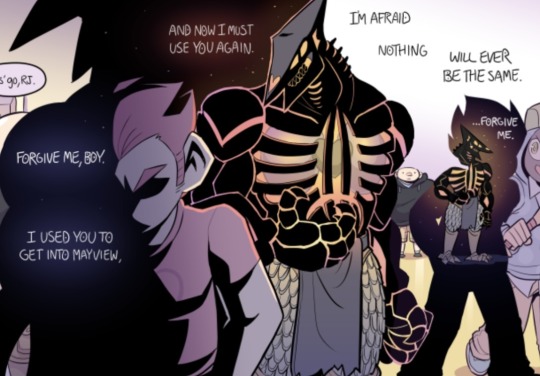
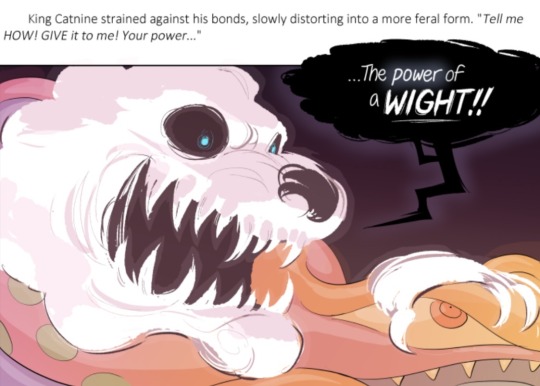

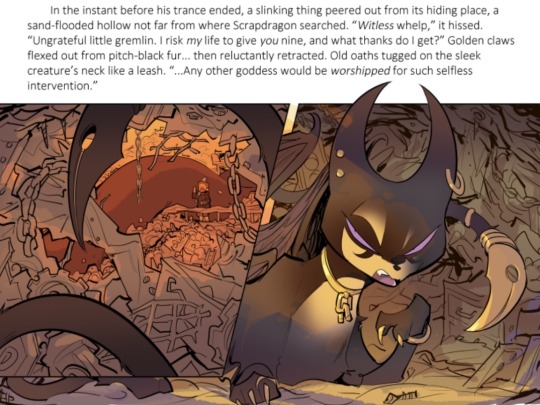
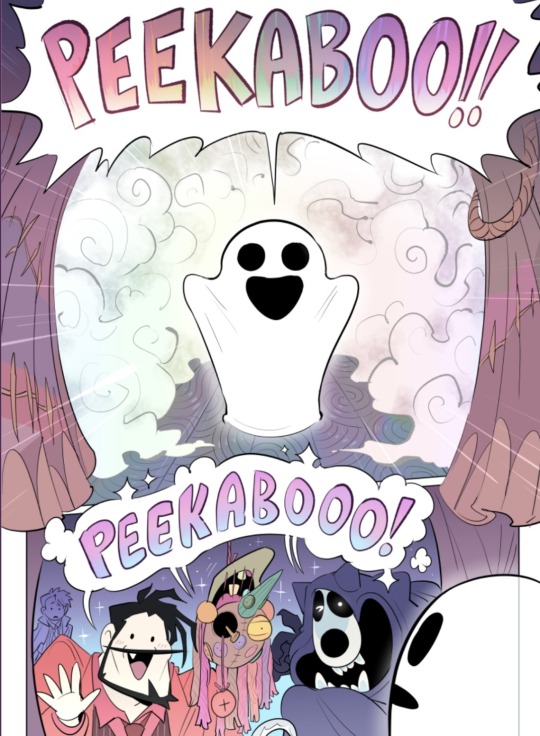
I am so glad that the kid spectrals have such normal and caring spirits who will definitely not physically endanger and/or cruelly betray them in the midst of their lives already being destroyed by cults, monsters, and interpersonal drama. It’s so cool and nice 👍
#paranatural#pnat spoilers#paranatural spoilers#*SHAKES THEM ALL* BE NICE TO YOUR KIDS?#Isabel doesn’t get an evil spirit partner but she does get all of her kind caring spirit partners forcibly taken from her#which she is subsequently scolded mocked and belittled for by a grown ass man. so she’s also not doing great over here#I also feel like these parallels(?) are maybe harsh towards some of them#catnine is just straight up shitty. pacts will almost certainly be shitty in the future but technically hasn’t done anything wrong YET#to max I mean. not in general. I side eye the sphinxes#muse and forge have the potential and motives to be shitty later but I personally doubt they will go as far as any of the others#and peekaboo. if I’m being honest. I don’t believe it genuinely has the capacity to fully understand that it is hurting/betraying Dimitri#like fully is just concerned with wanting a friend to play with and not being abandoned.#which obviously doesn’t mean that Dimitri WONT get hurt/betrayed further or that the hurt/betrayal is in any way less#we also do not know what’s up with Scrapdragon considering she is also currently incapable of experiencing complex thoughts lol#could be evil. could be cool. is currently just a big hungry and kind of irritated snake lady. which I love for her personally#I don’t remember if Scrapdragon has been given pronouns. just that max calls her girl. assigned lady snake by the protag.
118 notes
·
View notes
Text
part of jing yuan’s irresistible allure—in the bedroom, particularly—is how versatile he is. some may interpret his flexibility as boredom or laziness, both of which are far from the truth; in reality, he has simply sated the sexual curiosities of his youth, so is repertoire is vast. what he craves more than anything in the cosmos is intimacy and connection, which is exactly what you give him. and his open approach allows you room to explore your deepest desires without judgement—so long as you can clearly voice said desires (he is a scoundrel, after all).
#i have a few scenarios in mind where you’re embarrassed to ask him to do something#but there’s never anything to be embarrassed about#he may tease you for not being straightforward#but he would never judge you or make you feel bad for your kinks/fetishes/fantasies/etc.#i’m sure he has subtle preferences but idk i truly truly believe that he’s so accommodating#it just…clicks with his personality and circumstances#and maybe it’s the romantic sap within me but. i see him being most turned on by love and devotion rather than specific acts#he has seen so many people live and die…#(in my mind anyway)#so meeting His Person (whether you are a long-lived species or not) is kind of enough to get him going LOL#which now that i think of it is very soft yan but i see him as an indulgent king#— musings#— jing yuan#— honkai star rail
57 notes
·
View notes
Text
When talking about Amy and Rory as a unit, I call them "the elder Ponds". Because they are. It doesn't matter that River and the Doctor are older than them. They have had to mitigate rows between their own daughter and son-in-law. That immediately makes them the elder Ponds.
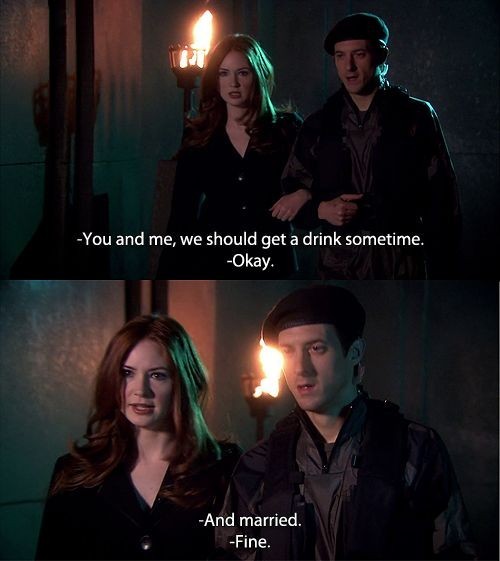
When talking about the Ponds, River is always included in it. Because River is a Pond first and foremost. Unfortunately we don't even have a proper Pond Fam pic because of what series 7–[gunshot]

#dw musings#tia talks tish#i should probably post those prompts in my asks#but instead i yap about something else. yes. that is unfortunately me.#anyways petition to include River in Pond fam edits#the ponds#amy pond#amy x rory#rory pond#river song#melody pond#doctor who#eleventh doctor#doctor x river#yowzah#doctorriver#rory williams#amelia williams#melody williams#i pond queue#do i know that moaning about how series 7 turned out will never change anything about it? yes.#will i still forever have beef with how series 7 turned out? yes. yes i damn will.#even the pond life minisodes didn't have river in it 💀
119 notes
·
View notes
Text
to rome: a play by fearandhatred
(5k words, 1/1 chapters)


While trying to tempt Caligula, Crowley makes a discovery that renders all his efforts for naught. But then it turns out that Aziraphale is here too, so maybe his trip to Rome isn't wasted after all.
***highly recommended to read on a phone because of the Multiplicity Of Line Breaks that just look very weird on a laptop unless your font size is huge
-----
i've always loved the idea of crowley falling in love with aziraphale in rome. in some ways it really is my roman empire so i figured i might as well make it happen! featuring many shenanigans and an annoying emperor :)
any and all support is greatly appreciated <3
anyway it all started with a dream:


so this is for @eybefioro @captainblou @crowleys-bentley-and-plants who challenged me to write a fic with no angst and also, coincidentally, for that one commenter who asked me on the same day if i would consider writing something happy for once. against all odds and with much difficulty, i have done it. love u guys sm <333
#fearandhatred#fearandfics#fearandart#i need to stop making that roman empire joke.#thank you to my muse george bernard shaw. i consulted many playbills and plays i owned for this fic but saint joan was the main one#if you guys see any mistakes in the fic. even a Space (especially a space) literally just tell me bc this is unbetaed#also i wish i could have done more monologues like older plays usually have but due to the Nature and Tone of this fic i couldn't#maybe another time i'll do another play but a more serious one because i really wanna try that. but also formatting was hell so maybe not#anyway. begging you to not see this as a measure of my writing skills because i have never done anything like this before#both in concept and in trope (happy)#ok the longer i let this sit the more i started to doubt it was any good so i am going to sleep now lmfaooo goodnight#i literally almost chickened out of posting this helppp it is not that serious#good omens#ineffable husbands#aziracrow#crowley#aziraphale#good omens fanart#good omens fanfic#good omens fic#good omens fic rec
124 notes
·
View notes
Text


what the polygun!!!
#trigun fanart#trigun#vash trigun#nicholas d. wolfwood#meryl stryfe#milly thompson#polygun#polycule#im sick for them#you dont even get it im a man possessed#i just wish they could eat a meal together#and play fight and hug after and fall over into a pile laughing#i want them to be happy#and love#polygun my favorite muses#the day i draw them anything besides sickeningly sweet is the day you know ive gone mad#too scared to make angst of this ship they are my comfort#but i so could do it#and boy do i have some thoughts
132 notes
·
View notes
Text
this isn't intended to be a judgment on anyone in particular, but I'm surprised on how few people in the cccc fandom write image descriptions for their art considering the existence of a character who would realistically need to use them {whether you interpret heart as low vision or light sensitive or fully blind} it's just kind of ironic how the characters in the media couldn't even access the content made for it
anyways, if you have the ability to write image descriptions for your work, I highly recommend doing it! it's pretty easy once you get the hang of it :-)
#maybe it's because i'm used to it in podcast fandoms? it seems more prominent in audio only fandoms like podcasts#which makes it extra weird cccc doesn't have that since it's an album? with visuals in the videos but still#again this isn't a callout or anything i'm moreso musing about like. the culture of fandoms#uhhhh. i guess i'll tag this in the fandom tags#cccc#chonnys charming chaos compendium#chonny jash#ack i hope this doesn't come off judgemental. well it is a little bit because accessibility is important#but it's not. a judgement of character. yknow? i think a lot of people just don't think about it#this is alright to rb by the way i think all fandoms need to have a discussion about accessibility in fan content#if this post inspires anyone to try writing image descriptions for their art i'll be very happy ^-^#i don't need a screenreader myself but i'm light sensitive and can get migraines looking at art sometimes. so the option is nice#ANYWAYS. was thinking about this for a while but was too scared to post it#but i figured now is a good time since people are addressing concerns in the fandom#{which. i'm not touching that one. for personal reasons that i don't want to get into lol}#tridential tirade
27 notes
·
View notes
Text
Harry in the final duel: I know lots of things you don't know Tom Riddle.
Ginny: Tom Riddle?! From my diary?!
#no but for real did anyone ever fill her in on who riddle was? i don't think they did. harry never tells her anything#harry after the war like 'so i was hunting horcruxes'#Ginny: what's a horcrux. Harry: so remember that diary you had?#Ginny 5 minutes later: Can't believe I sort of fell for something that had a bit of voldemort in it#Harry: um. so i have some news.#Tom Riddle#Harry Potter#random musings
73 notes
·
View notes
Text
Sloan comes back before IAESL to ask Julian if he's reconsidered joining Section 31. And Julian reluctantly says yes, remembering Sisko's orders and unwilling to disobey them, despite (or perhaps, because of) the captain's recent departure from the station.
Naturally, Julian needs some tutoring in the finer points of spycraft, which Sloan is more than happy to give him. And the first few late-night sessions aren't so bad - a bit dull, especially considering all the far more interesting lessons Garak had given him over the years - but they're fine. Whatever.
He doesn't really think it's necessary to book a few days of leave for the 'intensive training course' Sloan wants him to go on, but the spy insists, so Julian gives in, and lets himself be taken off the station. Garak's lessons in paranoia clearly hadn't sunk in deep enough - he can't stand Sloan, but he's not expecting anything worse than too much self-satisfied smarminess, and he's definitely hoping he'll finally be able to find a bit more out about Section 31.
Sloan, on the other hand, awaited their getaway with great anticipation. He'd ran intensive training courses before - "intensive" here meaning "how to withstand torture" - but he imagined that teaching Julian Bashir would be particularly satisfying. How long can augments hold their breath for? he mused. He'd have to try it out.
#Sloanshir#Luther Sloan#Julian Bashir#And after all of it I think Julian's primary feeling is gonna be shame that he doesn't get anything more on s31#Idk if he'd even tell anyone what happened#He should have known better than to willingly go off with Sloan right?#My trek musings#Free-for-all fic ideas#Wsb
45 notes
·
View notes
Text
tbh i think that even unwinnable fights should be winnable. some of the BEST fights i've ever run as a dm were ones i built kill the players (in a fun way. I had some cutscenes prepped so even the loss would be a different flavour of win)- but then they were clever bastards and managed to either win the fights or pull themselves out of trouble. I think it's perfectly fine to plan for a fight that players aren't supposed to win, but you need to let them. if they can't win, they can't lose, and the meaning of that encounter is diminished. do that too many times, and they stop trusting you to give them roleplay prompts and start expecting to sit there waiting while you drive the story for them.
but if they can win... if there is always the chance to win, no matter how impossible the odds, then they ALWAYS have hope. they always get invested. they feel the big emotions of success or the big emotions of failure, and you fucking Win as a dm/roleplay prompter/lead bastard.
#qsmp neg#qsmp crit#discourse#<- for blacklists#im not grumping or anything im just musing on like. the mechanics of why everyone is so upset about the latest fight#and how it can be avoided while still keeping these fights genuinely difficult and intense#its hard because there's so many players and they all have wildly different strengths and weaknesses#so someone who could take on the code easy needs that enemy scaled differently than someone who isn't a big fighter#but it's hard to do that in a world where they interact w the same enemy#and you only have so much man-power to cater to a big server like this one#and then you bring in the big powerful items that the players can and can't access but which the admins have ultimate power over#and the fact that some of the admins themselves have lag issues or aren't super great at pvp so they accommodate that with better gear#and it starts getting messy#but for the fights themselves yeah regardless of what armour or gear or killing-methods they use there should Always be a win condition#and idk maybe there was one and we just didn't get to see it#but if that win condition is 'parents sit in the safe room with their babies while the others are overrun'#then i think there are ways to build better win conditions#anyway i love game design and player/dm interactions qsmp hire me now i want to know your behind the scenes#jk im too busy to apply#but man. i wanna nerd out so bad that sometimes i think about it
154 notes
·
View notes
Text
Barely two minutes into Grian's Ep 8 and I'm losing it... what a fantastic task, oh my gosh. Jimmy on Discord haunting him from beyond the grave...
Every bit of that so far, from "No way!" to "Prove that you can see me!" and "This- This is mad-" is gonna make awesome 'fic material...
Jimmy: "And you're looking at Etho and ZombieCleo"
Grian, panicked, cutting him off: "Okay okay okay okay okay!"
#Secret Life#Grian#trafficblr#Jimmy Solidarity#traffic life smp#Secret Life SMP spoilers#Secret Life spoilers#When I saw people teasing Grian for saying 'admin fairies' I was like '... but don't they literally have an admin named Sonam-#who's in Bdubs Last Life Ep 1?' and idk if this is how it works but now I'm thinking maybe Jimmy's on the admin account?#Can the admin account be invis? I am intrigued#^ I am liveblogging so this might get disproven later just something I've been musing over#Would love to find a place for Sonam in my fic but idk anything about them wheeze#Riddle watches Traffic#mcyt#traffic spoilers
173 notes
·
View notes